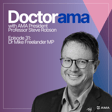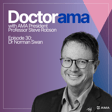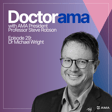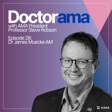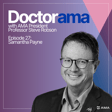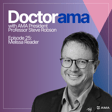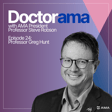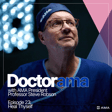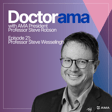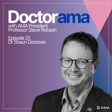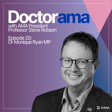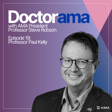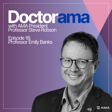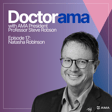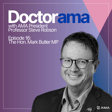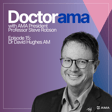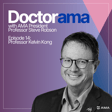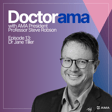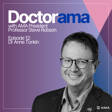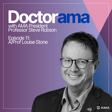Become a Creator today!Start creating today - Share your story with the world!
Start for free
00:00:00
00:00:01

Episode 26 - Krystal Barter
In episode 26 of Doctorama AMA President Professor Steve Robson chats with Krystal Barter, founder of Pink Hope and Humanise Health.
Recommended
Transcript
Introduction to Facing Future Challenges
00:00:00
Speaker
Well, at some time or other, we've all wished we could see into the future, but be careful what you wish for. What if your future holds challenges for you that are quite extraordinary, challenges to your sense of self, your sense of family, challenges around who you are?
Meet Crystal Barter: A Story of Family and Health
00:00:18
Speaker
Well, we're going to talk to someone today who's faced these challenges head on, on Dr. Armour.
00:00:26
Speaker
You're listening to Dr Rama with Steve Robson, bringing you the best of health, medicine and people. My guest today on the Dr Rama podcast is the incredible Crystal Barter. Crystal, welcome to Dr Rama. Thanks for having me, Steve. Crystal, we're going to talk about a lot of things over the next little while, but I want to start by getting a sense of who you are.
A Childhood Shadowed by Health Issues
00:00:50
Speaker
I'd really like to hear a little bit about where you grew up, your childhood, and I guess what your plans were when you were a young kid.
00:00:57
Speaker
Oh my goodness. um Now that's taking me back. I'm turning 41 this year so so there's a start. um So I grew up in quite an idyllic a place called the Northern Beaches in Sydney. So very lucky I had the proverbial picket fence and had a wonderful family and a brother. But I guess, you know, I grew up from a really young age with something that a lot of other families didn't grow up with. And that was pretty much everyone around me in various stages of sickness, scars, health trauma. So behind that picket fence, I guess, for my family, it was just a lot of health issues and trauma that we were dealing with. So
00:01:49
Speaker
you know, for all the great things that I had in my life, which I'm eternally thankful for, we had a lot of challenges as well.
Coping with a Family History of Breast Cancer
00:01:59
Speaker
so krista I know that your great grandmother, your grandmother, your own mother, all were diagnosed with breast cancer. And this was playing out. These things were playing out around you as as you were growing up. Yes. So I can remember lots of vivid memories being in a small country town in New Zealand called Matamata. That's where my maternal family is from.
00:02:28
Speaker
And my nan um had prosthesis, and she'd had bouts and bouts of of cancer. And I was fortunate she that she was there, but I grew up with her um unwell a lot of my life. And I can remember thinking how hilarious it was that I could get her prosthesis and put it in my outfit. And I used to go around the house singing jolly puns. So when you're young, When you're young, you know you you don't quite understand what it all means. um And it wasn't until you know I hit around 14 when my mum was diagnosed and my mum really didn't cope.
00:03:06
Speaker
out with the experience um as you wouldn't. like it ah singular cancer A singular cancer diagnosis is hard enough, but having you know every woman in a family and then looking at your own daughter, i can looking back, I get that now. um But as a 14-year-old, I was like, mom, like come on, like I've got things to do. and you know, then I started growing my own breasts and growing up in a body that you don't trust is is a really, really difficult experience, so I think, for anyone. And um I know that emotionally, I really, really struggled with that um and turned i've
Choosing Genetic Testing: A Young Mother's Decision
00:03:51
Speaker
I've got a book. So, you know, I was very, very open, you know, the turning to drugs and alcohol um and led quite a reckless teenage life.
00:04:01
Speaker
um whether that played a huge part in it or whether I was just naughty, who knows? I'm making no judgments, Crystal. here Yeah, ah look, um it's definitely made me into the person that I am today, um and the parent I am for sure. But I think, you know, watching and knowing every woman in your family, 30s, 40s, 50s, faced, you know, what you don't wish on your enemies faced that right in front of you really shaped my life. Crystal, you have um the diagnosis of carrying the BRCA1 mutation. How was that broken to you? How did you receive that news? So um I had
00:04:53
Speaker
So, I became a mum, um surprisingly. My husband and I now have three children, been happily married for 20 years, but I was a mum at 21. So, growing up alongside a baby was quite... He's a whole nother podcast thief, but... But I can remember having my son holding him in my arms and looking at my husband saying, I have to have this genetic test. Cause it was offered to me when I was 18 and I was like, I'm not ready. There is no way in hell that I can deal with this knowledge now.
Living with BRCA1: Changing Her Future
00:05:28
Speaker
So held my baby, made the decision, went and had the test, simple blood test, but it took months because this was a long time ago. This is like 20, 20 years ago, right?
00:05:42
Speaker
So I went in and I'm still today friends with the geneticist that gave me the information, Dr. Kathy Tucker, um and she's been a part of my family and such an integral part of my family. She had a piece of paper and I remember vividly, she looked into my eyes and she said, Crystal, do you have this genetic mutation, the same one as your mum does. And I was like, okay And just that moment where you feel like an out of body experience where I was like, wow, I felt like on that piece of paper, like my whole life changed in that moment. And she looked at me and she said, but if we get this right, your outcome will be completely different to that of your mum's and your grandma's and your great grandma's.
00:06:34
Speaker
And I said, how? Tell me, tell me now and I'll do it. And she very succinctly walked me through a few of the options, but she said, right now, I just want you to go home and, you know, just look after yourself for a little while and then let's come back and talk more deeply about these options. Because it was like a lot, and I'm not the type of person So I'll go straight home to Dr. Google and like, just i I went into the you know the trenches of Dr. Google for months and months. So I'm that person. um But I was very lucky that I had an amazing geneticist who held my
A Proactive Health Journey Begins
00:07:17
Speaker
hand. um
00:07:18
Speaker
It's very empathetic um and knew the impact that this is going to have on my life. and I you know credit her and a lot of my healthcare professionals for really giving me the strength to help me save my own life. Crystal, I'm going to talk about two things. I'm going to talk about mastectomy and I'm going to talk about ovarian risk-reducing surgery. secondly Many, many, many people listening to this will want to understand how you went through the counselling and came to the decision for the risk-reducing mastectomies that you had when I think you were 25. How did that play out for you emotionally and and and I guess on on the dynamics, your self-perception and things like that?
00:08:06
Speaker
a So I was in a different position to a lot of 25-year-olds. like I had two young children. And i can I can remember I was going, I had to fight you know being one of the first women in my family and and you know one of the first women in Australia to kind of have this information at such a young age when genetics really wasn't at the forefront of preventative health. So I was kind of like pushing through barriers that were there to change my own healthcare.
Embracing Prevention: The Mastectomy Experience
00:08:39
Speaker
So I pushed to, and I wrote a letter to get access to early mammography yeah because i wasn't I wasn't the wait and see approach type of person. I was i was proactive. You know, that's it. Yes, I do. So I had to actually
00:08:57
Speaker
I wrote a letter and I had to position, you know, getting early access to this because they wanted to start a ah screening me at my mum's diagnosis. And so I had to show the evidence that it was It came from 68 to 40s to 30s. So I pushed to get early access to that. And it was the second mammography in my in my screening that came up with linear lines of calcification. And um my surgeon took me upstairs and she said, look, it could be nothing. But we take this seriously. It it looks like it's something. What do you want to do?
00:09:37
Speaker
And they said we're going to rush you upstairs for a biopsy. And I looked at them and I was like, take them. I said, I am not walking this path. um Take them. But I had done three years of research. I had connected with. some of the world's leading experts on this issue. I had spoken to pioneers who had been the first in the world to undertake this surgery. I had done a lot of research, so I wasn't going into this blind. um I knew that this was going to be the best chance that I had to stay healthy for my children. um and And for me, I'd been so lucky. i I'd had children young, I'd been out to breastfeed,
00:10:25
Speaker
I was losing so much, but I was gaining so much. And I went into that surgery really wanting to remove that dark cloud on my life. like I had, you know after breastfeeding two babies, I wasn't losing much in that regard. But I was losing a sense of myself. like It was a big deal. um And you know mastectomy surgery techniques have improved over the last 20 years.
From Surgeries to Strength: Finding Gratitude
00:10:53
Speaker
but you know It's still ah not an overly nice surgery. um I can remember waking up with a hippo sitting on my chest. It felt really tight. um and It turns out that you know my reconstruction didn't take very well. I ended up having to have seven surgeries with the last one being two, three years ago. and i ended I ended up flat. like After all of that,
00:11:19
Speaker
um you know, step after step, surgery after surgery, like my implant exploded, like I had everything that could go wrong, go wrong. And yet I still sit here. And I went through a period of depression, I'm going to be totally honest, like when I had my breasts removed, and I looked at my chest, and it was the exact chest that my nan and my mom and every other generation had before me. And I looked at myself in the mirror and I was like, you are lucky, you are lucky, you are lucky. And I didn't feel it. And for the first time in my life, I didn't feel lucky when that happened. But I managed to find myself again, um turn the light back on and find my luck and my strength again. And that took
00:12:10
Speaker
a lot of time to be able to do that. um But I ended up finding my way again. And then I was into the next preventative surgery. So it's been a pretty relentless like period of time in my life. So I don't want to give the illusion like I just had my breasts removed and everything worked out. And then I just had this and that like, I have a lemon of a body stage like they study me in a lab. And people look at me and they're like, you look so healthy. e
00:12:40
Speaker
And I'm like, oh my Lord, like, where do I start? Like when I go see, when I go to hospital, ah they're like, how many surgeries have you had? And I'm like, I've had like 20 surgeries, like writing an essay. um But I still like, I see that, that luck in my experience. um When you see the alternative um of what, cancer and generations of cancer and the fear and the recurrence and that. And I know that I'm lucky.
Founding Pink Hope: A Path to Purpose
00:13:21
Speaker
um And all I'm trying to do effectively is give myself time, time that I'm well with my family. I'm still gonna go the same way out. We're all going the same way out. I'm just trying to extend it.
00:13:35
Speaker
krista I appreciate the incredible emotional journey that you have taken. But the thing I still can't get over is that you founded Pinkhope. And as you know, I've been a big supporter of Pinkhope. I've been too spoken at the privilege of being on panels at various Pinkhope events over the years. What drove you at a time of such emotional turmoil to turn what you're experiencing into pink hope? I'd love to hear about how you got that going. so i um It sounds quite melodramatic, but I was literally laying in my hospital bed with trains hanging out and and um you know the gores and I was feeling at my absolute worst. And my mum had a laptop.
00:14:29
Speaker
and she passed it to me and I think I've even got the video somewhere or the photos of me laying in my bed with my laptop um and she said you know so much you can give so much and you can help and that's when I went I'm just going to create a forum I'm going to try and help people understand their risk and I'm going to try and support people and I did it selfishly at first because I wanted to create something where I felt like I had a bit of purpose and a bit of control. and I didn't think it would end up being what it was. The things that we we're able to do um and turn it from you know a forum when I was in a hospital bed at 25,
00:15:21
Speaker
um to being something that you know Angelina Jolie reached out to me, like you know done the most incredible things, fought to get bracket testing on Medicare. like yeah We've done so much um in the landscape and it gave me a sense of purpose in a time when I could have very easily just moved on with my life. um But I didn't think that was my purpose. I knew that I needed to do something useful. And I also wanted to give my mum something to know that I, you know, I'm all right. I've got this. You know, thank you. Thank you for forgiving me the power and the, you know, the love to be able to do something of use.
00:16:15
Speaker
And it was not easy. like Everyone will ask me, oh I want to start a not-for-profit. And I was like, oh Lord, he's the hardest job in the world, founding a not-for-profit and starting it from nothing. yeah But it has um taught me so much. I've learned so much from that experience that I think I'm a better person and I'm a better leader. and i you know yeah I've taken everything that I've learned and moved to humanized health and I can apply it across the whole healthcare sector. So I never regret my time um working in not for profit. I definitely was never going to retire in an island in the Caribbean, but it gave me more than
00:16:57
Speaker
you know any money could.
Navigating Post-Surgery Challenges and HRT
00:17:00
Speaker
um And that to me, I walked away, you know, to two, three years ago, gone three years ago, um to go on my next journey. um And that was really hard. But I think I believed it was time. yeah I've got more to talk about. And being able to work behind the scenes now helping others is probably even more rewarding. Now, look, I have a degree in genetics and as a gynecologic surgeon, a significant amount of my work is around risk-reducing surgery and speaking with women about this. But despite my experience and and the training that I've had, it is never an easy discussion. It's your take on having risk-reducing surgery and taking the tubes and ovaries in this situation.
00:17:54
Speaker
Yeah, so I approached mine quite differently because um I was at the right beginning of the conversation where they were like, take your tubes because we know that quite a bit of ovarian cancer may start in the tubes. So I had them removed when I was 31 and one ovary. So I did like a phased approach heading towards surgical menopause. So I did that, but then I had atomyosis at 35 around my uterus. I had a huge issue. So I had to have a full hysterectomy.
00:18:36
Speaker
Then I struggled in a period of time where my body just wasn't responding. um I now know ah that I was in perimenopause. My body just wasn't feeling its best. yeah About 18 weeks ago, I had my last ovary removed. yep That was probably one of the hardest decisions for me because i couldn't just have it removed and move on with my life normally i was going straight into surgical menopause forty and if i did nothing.
00:19:08
Speaker
I would have had my mother's menopause and now watching my mom go through as a breast cancer survivor and having a tumor on her ovaries and at 43 having her ovaries removed and she was of the generation where you don't get HRT. And she has suffered for 20 years the worst menopause symptoms I've ever seen. um and It scared me. It scared me so much. I was like, oh my God, what if HRT doesn't work for me? you know I'm going to put on weight. it's It's all these things that I had been told that this is what it would look like. and It's been the total opposite for me. I have found myself again through HRT. My body has responded beautifully to it. um
00:19:58
Speaker
you know ah so it just is kind of like the puzzles have come the puzzle pieces have come together that i actually realized that i had issues with my hormones for a huge part of my 30s if i feel this good now so um i think the conversation has to be broad, it has to be looking at um you know hormones and we have to be talking about that and we have to help women make you know really um important decisions based on the most relevant evidence. And it's not an easy topic of conversation to have. um
00:20:44
Speaker
the ovaries are such a huge, and you know your hormones are such a huge part of your overall wellness. But I think we've got to look at it really broadly. And we have to look at quality of life. And we have to look at easy young women, they're in their 40s. So we have to be looking at it, um you know, broadly across the whole lifespan, because I don't want to see women suffer anymore.
Advocating Against Genetic Discrimination
00:21:10
Speaker
Crystal, I want to talk about two more things. The first thing I want to talk about is something that we've discussed a lot. And I've done a previous podcast with Dr. Jane Tiller about genetic discrimination and the fact that on one hand, having information
00:21:25
Speaker
about your genetics gives you so much control and so much power, yet at the same time it also puts you at risk of a situation where you may not be able to get life insurance or other forms of insurance that you need to protect your family and give you certainty. What are your thoughts about this, Crystal? Wow. This issue, firstly, I could spend a whole 20 minutes talking about how much I love Jay. I reckon you could spend more than that, Crystal. I've worked with her for seven years on this issue and her and I, like, yeah, I absolutely adore that human and I don't think the issue would
00:22:05
Speaker
be where it is today without the work that she's done. The best thing that's ever happened to this advocacy. um So seven years ago, um Sophie Scott, um who he knows well, wrote and allowed me to write an op-ed piece for the ABC. And it said, I may have a genetic mutation, but I don't deserve your discrimination. And it talked about my family's experience. And that was kind of like the catalyst for change and the conversation to happen. And basically, every person who goes in for genetic testing today and for the last you know however many decades is given two options.
00:22:55
Speaker
You have this test and it can potentially save your life. You could potentially go on to have, you know, carrier screening. You could have preventative surgeries. You can take action with this knowledge for you and the future of your family. But we have to tell you, by law, we have to tell you that the life insurance industry can deny you coverage or it could cost more and you are discriminated against. And I don't care how many times how many press releases in the industry, you know, releases saying that they don't believe it happens. It does. The evidence is there. The glimmer of hope study. Everything has been done to prove that this is an occurrence in Australia. Australia is one of the last countries, um you know, in the modern world to enact this. And I believe right now we've got a government
00:23:51
Speaker
um you know that's very focused on social justice. So I think for me, this is the perfect moment, the perfect government to do something about it. And there is so many benefits to putting this policy and ban in place. We should no longer allow any commercial entity to hold patient's choice and patient knowledge in their hands. It is impacting science, research, clinical. It is impacting every area of healthcare.
00:24:25
Speaker
And if we we withhold this information from families, it is negatively bent like it is having a negative impact not only on the life insurance age ah industry, but it's having a negative impact on healthcare. and Really, at the end of the day, um if you know your genetics, there's often a whole lot of times you can do something about it. And it might not be this generation, but it could be the next. it So it's it's the part of the knowing that's the most important bit of it. And in that moment, as a patient, as a family, when you're told that,
00:25:05
Speaker
you may be discriminated against, that makes that decision and that risk analysis that much harder to do. um So a lot of people and families don't have testing um because of that very reason and that is reason enough to put a ban on it and the fact that we're still talking about this seven years later, um it's just It's disappointing um and i'm I know that we are so close and we just
Podcast Closing: Celebrating Crystal's Impact
00:25:40
Speaker
need the government. We just need them to stand beside us.
00:25:44
Speaker
um Beside patients, beside organizations, put a ban on this and let let us move towards a future where you can know your risk of any illness and you can change your future. And that's really at the core of what science has given us. um And this is this is the year. I'm telling you, they're going to do it. Well, Crystal, you know very well that you and Dr. Tiller and I and so many others all stand together. We've all been working on this issue and I'm very, very hopeful. Crystal, you have given us a masterclass in taking control in difficult circumstances. Something I didn't get to, but I would like to talk to you in a future podcast is humanized health. and That's ah a big thing. I think we're slightly out of time here but we will talk about this, I promise you. Crystal, you're an incredible achiever. You're so busy. I can't thank you enough for taking the time to speak with me today.
00:26:46
Speaker
Oh, and Steve, honestly, thank you so much for the work that you um have been doing. um The AMA in the sector is is better because of you and your vulnerability and your passion for issues. um So we're going to miss you and I know you're not going to leave the space. You're going to come and hang out all the time. ah So yeah, thank you for the incredible work that you have done um and you've actually cared about issues that matter to patients ands and that's a great leader and thank you so much for having me on your podcast. It was a real pleasure. Crystal, thank you so much. We'll talk again soon and thanks to everyone for listening on Dr Rama.
00:27:36
Speaker
You've been listening to Dr Rama, a podcast produced on Ngunnawal country by the Australian Medical Association. All rights reserved.
